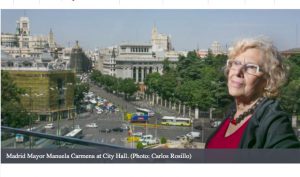. . DEMOCRATIC PARTICIPATION . .
An article by Rubén Amón, Mathieu de Taillac, and Alessandro Oppes in El Pais English Reprinted for non-commercial purpose and abbreviated by CPNN
In this joint interview by EL PAÍS, Le Figaro and La Repubblica, Manuela Carmena takes stock of her first year in office and talks about politics, ideology and the larger role of cities in the world. . .

Question. Do you think there is a feminine sensitivity in the way public affairs are run in some places? There are female mayors in Paris, Rome, Barcelona, Madrid…
Answer. Yes. I have insisted repeatedly on the fact that women’s culture is more closely linked to daily, practical affairs. It is the culture of life. Development policies underscore the active role of women, their role in family economics. Poverty programs rely on women. If there had been women at the helm of Spain’s parties after the December 20 election, we would have had an agreement.
Q. What about the debate over big cities that take on state-level issues, from the environment to immigration?
A. Cities are taking on many powers that we have lawfully won. It happened with the refugees. We reached deals with the UNHCR to carry out a refugee welcome plan. We have the ability to set up structures, emergency services. It’s simpler for us than for a big state apparatus. We have taken in people who arrived through irregular channels. They were helped. We have networks that the state lacks. We have to move on from a functional role to one of real power. We are closer to the problems on the ground.
Q. Do you consider it necessary to implement a cooperation network among the great European capitals?
A. There is a link among the cities. There are common concerns. I am thinking about participatory budgets. We did it in Madrid, but they could be organized with other cities for common projects. Lisbon, Paris and Madrid form a historical axis. Cities can end the democratic apathy. And like [UN Secretary General] Ban Ki-moon says, apathy is poison to democracy. European cities can counter this lack of mobilization. We need a framework for the relationship among them. We are capitalizing on a way of living history. We are in a position to master a formal framework that that has surpassed the capacity of nations. Communications have put an end to borders, they have destroyed them. Cities have become the arena with the greatest potential for citizen empowerment.
(Article continued in right column)
(Click here for a Spanish version of this article)
How can culture of peace be developed at the municipal level?
(Article continued from left column)
Q. At the same time, a major competition is now underway over the “bounty” represented by Brexit.
A. There is a loyal competition underway. Madrid is very well placed – because of our growth potential, our young people’s talent and our competitive salaries. Also, Madrid is a very safe city, its transportation system is practically unmatched and the climate is extraordinary. We need to make the most of all those qualities.
Q. The Paris attacks led Madrid to organize a Peace Forum, to try to implement together with the French capital a preventive policy of sorts.
A. Yes, because we are aware that the big cities are also host to negative elements and a breeding ground for violence – from gender violence to young criminal gangs. It all needs to go through a pro-peace education. And it starts at school. We want children to learn the value of dialogue and mediation, and for them to learn to solve their own problems among themselves.
Q. But don’t you get the impression that all the major attacks in London, Paris, Madrid and Brussels have created a terrorist psychosis?
A. No matter how much cities feel psychosis over terrorism, citizens will not give up on life in their city. I did not see such a psychosis in Paris. I don’t see it in Madrid, either, despite our own experience with terrorism. Cities do no give up on the notion of life that easily. And they are less susceptible than it may seem from the outside.
Q. You’ve already said you will not seek re-election. What kind of city would you like to leave behind?
A. I would like to have achieved two things. For people to value the change in attitude, the closeness to the citizens, the clean ethics. And for them to appreciate the improvements to the city: Madrid will have more flowers, it will be greener and cleaner, more balanced and more fair.
(Thanks to the Global Campaign for Peace Education for publicizing this article).